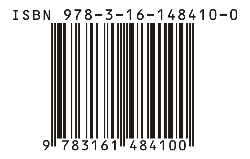In the publishing world books are often identified by their ISBN. ISBN is the abbreviation for International Standard Book Number which is unique to a book, or sometimes just an edition of a book. Although this numbering system traces its roots back to a 9 digit number just intended for books published in Britain, it became an international 10 digit system way back in 1970. Since 2007 it has become a 13 digit number which is often used as the bar code printed on the back cover of many paperback books.
Of course a book doesn’t have to have an ISBN. The book would still have its title and author to identify it. For an author the problem would be that not having an ISBN would limit how many retailers will take your book. An example would be Apple © who demand an ISBN on all eBooks sold in their iTunes © store.
The rules in issuing an ISBN state than you can’t use the same ISBN for both the printed and digital editions so it would take two ISBNs to have both. In fact the letter of the law points to different formats of eBooks having different ISBNs, but the industry has ignored this rather over regulation and uses the same number for all versions of the eBook.
At the present time we supply free ISBNs issued by the National Library of Thailand, the country in which we are based, to all our authors. If needed ISBNs issued by other countries can be obtained, but at a price.

